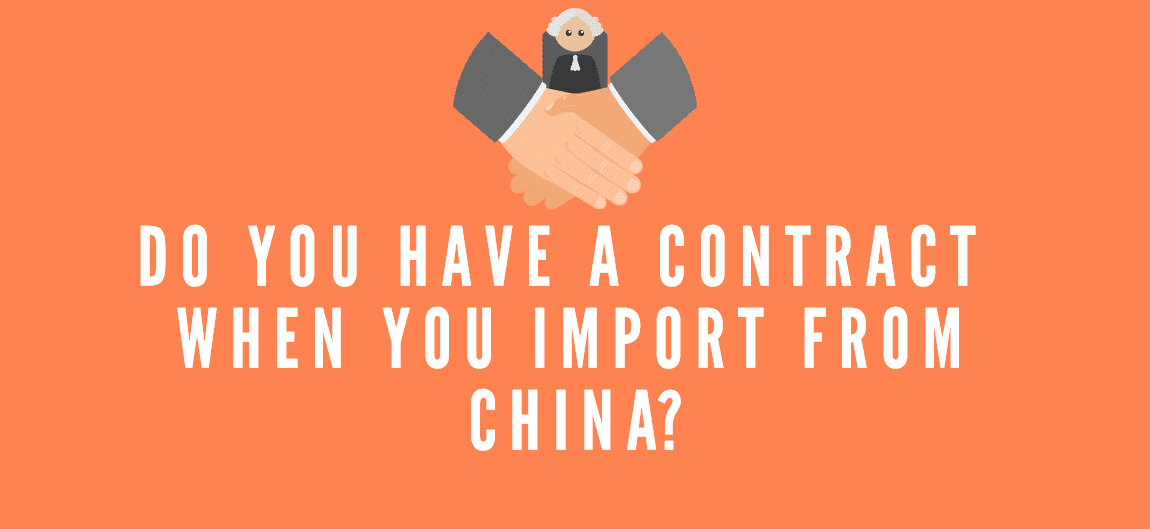A Slightly Panicked Guide to China Import Contracts in 2024
Why Your Sales Contract Could Make or Break Your Import Business (And Your Mental Health)
Imagine investing $50,000 in a product order, only to receive a shipment that looks nothing like what you expected. Perhaps you ordered sleek black phone cases but received neon pink ones with "FUNCY PHUNE" printed on them. Or maybe those "genuine leather" wallets you ordered turn out to be made from something that's technically "leather" in the same way that a hot dog is technically "meat."
This nightmare scenario happens to importers every day – and it all starts with a weak or incomplete sales contract that provides about as much protection as an umbrella in a hurricane.

The High-Stakes World of International Importing (Or: How to Age 10 Years in 6 Months)
In 2024, global supply chains are more complex than ever. Importing from China remains a lucrative strategy for businesses, but the margins between success and costly mistakes are razor-thin. Your sales contract isn't just paperwork – it's your ultimate shield against potential disasters, your business prenup, and possibly the only thing that will keep you from developing a stress-induced eye twitch.
5 Critical Elements Every China Import Contract Must Include (Unless You Enjoy Surprise Disasters)
1. Hyper-Detailed Product Specifications (Because "It Looks Kind of Like This" Isn't a Specification)
Gone are the days of vague descriptions like "blue shirts" or "plastic toys that don't immediately fall apart." Modern contracts require specificity that would make a Swiss watchmaker proud:
- Exact dimensional specifications (to the millimeter, because "about this big" gestures with your hands don't translate well across continents)
- Precise material composition (not just "metal" but what kind of metal – there's a difference between aerospace-grade aluminum and whatever they found behind the factory)
- Pantone color codes (because your idea of "royal blue" might be their idea of "electric purple with a hint of existential dread")
- Detailed packaging requirements (unless you want your products arriving in what appears to be recycled newspaper and hope)
- High-resolution reference images (from multiple angles, because "I thought you meant the OTHER side would have the logo")
- Explicit logo and branding guidelines (to avoid your brand name mysteriously acquiring extra letters or creative reinterpretations)
2. Ironclad Quality Control Provisions (Or How to Define "Good Enough" Before It's Too Late)
The best contracts in 2024 go beyond standard definitions of quality and into territory so specific it borders on neurotic – which is exactly where you want to be:
- Zero-tolerance for critical defects (with "critical" defined in excruciating detail, not just "you'll know it when you see it")
- Clearly defined major and minor defect thresholds (with percentages, examples, and possibly dramatic reenactments to illustrate your point)
- Mandatory third-party inspection protocols (because "my cousin checked it and says it's fine" isn't quite the quality assurance you're looking for)
- Automatic compensation mechanisms for quality failures (spelled out in advance, not negotiated while you're crying over a warehouse full of unusable products)

3. Payment Terms That Protect Your Investment (And Your Ability to Sleep at Night)
Current best practices recommend payment structures that don't require blind faith or a strong belief in karma:
- Maximum 30% upfront payment (because 100% upfront is basically saying "surprise me!" to someone you've never met)
- 70% payment only after comprehensive quality inspection (trust but verify, with emphasis on the "verify" part)
- Clearly defined inspection criteria (so "passing inspection" doesn't mean "we glanced at it from across the room")
- Escrow or secure payment platforms (because your bank account information shouldn't be more readily available than your Netflix password)
- Penalties for missed production timelines (since "it's coming soon" can otherwise mean anything from tomorrow to the heat death of the universe)
4. Production Transparency Clauses (AKA: Where Is My Stuff Actually Being Made?)
Modern importers demand transparency that would make a glass house look secretive:
- Confirmation of on-premise production (so your high-end products aren't being made in someone's garage between oil changes)
- Full disclosure of potential subcontracting (because surprise subcontractors are rarely the good kind of surprise)
- Real-time production tracking capabilities (more detailed than "we're working on it," less intrusive than a 24/7 livestream)
- Mandatory documentation of manufacturing process (pictures or it didn't happen)
5. Comprehensive Warranty and Replacement Strategies (For When Things Inevitably Go Sideways)
2024's top contracts include warranty terms that actually mean something:
- Explicit warranty terms (with real timeframes, not "for a reasonable period" or "until you forget about it")
- Clear spare parts replacement protocols (so you're not left explaining to customers that their $500 gadget is now a paperweight)
- International shipping provisions for replacements (because "come pick it up at our factory in rural China" isn't a viable solution)
- Time-bound resolution mechanisms (measured in actual calendar days, not "eventually" or "when we get around to it")

Pro Tips for Bulletproof Contracts (Or: How to Close Loopholes Big Enough to Drive a Truck Through)
🚨 Warning: Never settle for:
- Verbal agreements (worth exactly as much as the paper they're written on)
- Sales staff signatures (who may have less authority than a mall security guard)
- Incomplete specifications (leaving room for "creative interpretation" that rarely works in your favor)
- Vague quality standards ("good quality" means something very different when you're not the one paying for it)
The Non-Negotiables (Or: The Hill Your Business Should Die On)
- Factory owner/manager signature (not the friendly sales rep who will suddenly develop amnesia when problems arise)
- Official company stamp (the Chinese equivalent of "I really, really mean it")
- Detailed annexes with precise specifications (boring? Yes. Crucial? Also yes.)
- Third-party verification clauses (because sometimes you need a professional to say "this isn't what you ordered")
The Cost of Cutting Corners (Or: How to Turn a Profitable Business into an Expensive Hobby)
A weak contract can lead to:
- Financial losses that make your accountant question your life choices
- Damaged business reputation that no amount of social media influencers can repair
- Inventory write-offs large enough to be visible from space
- Legal complications that make you wish you'd just opened that cute little coffee shop instead
Final Thoughts: Your Contract is Your Business Armor (Don't Go into Battle Wearing a Paper Towel)
In the rapidly evolving world of international trade, your sales contract is more than a document – it's your strategic defense mechanism against chaos, confusion, and potentially catastrophic misunderstandings. Invest time, seek professional help, and treat your contract as the critical business asset it truly is. Think of it as business insurance you actually write yourself.

Ready to Secure Your Import Strategy? (Or Just Continue Living Dangerously?)
Don't navigate these complex waters alone. Consult with a professional import specialist who understands the intricate landscape of China manufacturing contracts and has the battle scars to prove it.
Pro Tip: Many successful importers now use specialized legal services and contract management platforms designed specifically for international trade. Yes, they cost money. So does therapy after receiving 10,000 units of products that only vaguely resemble what you ordered.
Consult with ChinafulLink Team specializing in international trade before finalizing any import contracts. Because the only thing more expensive than good advice is learning lessons the hard way.